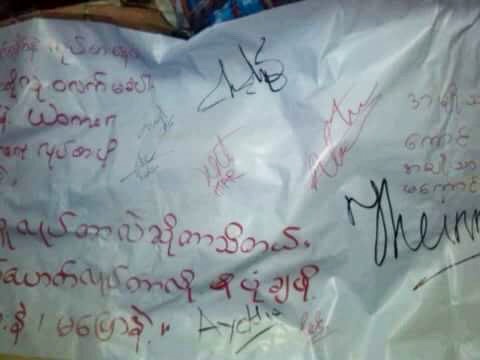
But when Zinmin Thu enrolled in a leadership training course at the pro-democracy organization Charity-Oriented Myanmar (COM) in 2011, she was certain there was no safer place for a young woman to work.Since its founding in 2004, COM and its founder, Chan Nyein Aung, were lauded as champions of women’s empowerment and attracted a steady stream of funding from international organizations and foreign governments. Most recently, in August 2018, COM partnered with the San Francisco-based Asia Foundation in publishing a Myanmar-language handbook on legal protections against gender-based violence and discrimination. Chan Nyein Aung wrote the foreword.In Myanmar, which has no laws explicitly outlawing workplace sexual harassment, domestic violence, or marital rape, safeguards against abuse have been especially weak.

Most of Chan Nyein Aung’s alleged victims say they stayed silent for years because everyone they initially turned to dismissed them, from COM staff to their own parents. One survivor writes in her complaint: “We were reluctant to make formal complaints because we knew he was a high-profile person who has very close relationships with famous [civil society] leaders and development partners.”One day, while they were driving in his car, the complainant says she was overcome by fear when she realised he was heading toward a hotel. “I screamed and told him to take me back home. He tried to take off my clothes and tried to rape me. I struggled so hard to escape from him,” she says. When she tried to end the relationship, he allegedly threatened to expose their “sexual conversations.”
COM's office in Yangon in October 2018. Photo courtesy of Jacob Goldberg.
According to experts in the field of protection against sexual exploitation and abuse (PSEA), the alleged failure by the US embassy and UNDP to prevent abuses at COM reflects systemic gaps in safeguarding mechanisms that are common within international development and humanitarian institutions as well as local nonprofits in the developing world.“Incidents of sexual exploitation, abuse, and harassment in the global aid and development sector are hugely underreported,” says Colleen Striegel, executive director of HumanitarianHR, an organization that offers PSEA training and investigation services to global development institutions.“When incidents are reported, often the response is inadequate or worse – no response at all. It is not uncommon for sexual abuse or harassment to be an open secret. In the vast majority of sexual exploitation, abuse, and harassment cases we investigate, staff in the organization knew that abuse was happening but did not report it,” she told VICE.After these attempts failed to trigger any accountability for Chan Nyein Aung, Zinmin Thu and her colleague considered giving up. For the next three years, they believed no one would be held accountable for the abuses allegedly perpetrated at COM.
According to safeguarding guidelines published in 2015 by CHS Alliance, another organisation that promotes accountability for abuses within humanitarian organisations, “those receiving a complaint have a responsibility to effectively respond to the complaint and/or refer it to the correct entity for action,” regardless of whether the complaint is made by the affected person or a third party.However, complaint recipients often fail to refer unofficial complaints to official channels, creating a blindspot that may allow abuses to continue for years after they are first reported.“Reports of sexual harassment, exploitation, and abuse do not always come through official whistleblowing channels, and there needs to be more understanding of this and training and awareness-raising on how to recognise, identify, and refer sexual exploitation and abuse concerns,” says Lucy Heaven Taylor, an independent safeguarding specialist who helped develop the CHS Alliance guidelines. The same guidelines were adopted by the investigation team that UNOPS, Diakonia, and Trócaire hired to investigate COM after they received the six women’s complaints in July 2018.Striegel added: “In our work, we stress the need for organisations to have multiple and varied complaint mechanisms, both formal and informal. A hotline is not enough. An HR email address is not enough. Complicated paperwork for filing complaints may deter survivors or other staff from reporting abuse. It is critical that management responds to unofficial complaints and rumours with the same urgency as formal complaints to determine if an investigation needs to be conducted.”“Many organisations choose to protect their reputations first, which comes at the expense of the survivor’s safety and wellbeing,” she says.
Chan Nyein Aung’s alleged victims also faced the added disadvantage of being employed by a local nonprofit rather than by a larger donor organization with more PSEA experience.“In many ways, the laws work in their favour. Even if the victim had nothing to do with the offence, they are the ones that carry the shame. Society can be cruel to them. For this reason, most women and girls do not report these crimes. They would be the ones who lose in this situation.”
Zinmin Thu stands against the Yangon skyline in June 2019. Photo by Jacob Goldberg.
That same month, however, UNDP’s Office of Audit and Investigation said it “found no fault” with the staffer who received the complaint about Chan Nyein Aung in 2015 and neglected to forward it. It cited a lack of a “contractual relationship” between UNDP and COM.UNDP’s spokesperson told VICE: “Today, UNDP has in place more robust policy and procedures related to sexual harassment aimed at strengthening how we tackle this abhorrent behavior and is providing better support to those affected…We express sincere sympathy and regret to anyone who has suffered sexual harassment or has felt let down by the organization.”The Asia Foundation, which partnered with COM to produce its women’s rights handbook last year, says it was unaware of the allegations until July 2018 and has not printed additional copies of the book since then. It said it would seek no future partnerships with COM.Upon learning that the allegations against Chan Nyein Aung were found credible by investigators, the National Women’s Dialogue organiser who hid COM’s defaced poster in 2013 told VICE on condition of anonymity: “I can see that that was my fault. They wanted to raise their issues, but because of a misunderstanding, we tried to avoid their issues. I feel so sorry about that. I have said sorry to the survivors.”Chan Nyein Aung officially stepped down as CEO of COM shortly after allegations against him were made public, but he reportedly continued to spend time at COM’s Yangon office throughout the rest of that year. Most of COM’s staff have resigned.Zinmin Thu now works for a different non-profit that seeks to strengthen Myanmar’s democratic institutions. She says she loves her job.The US embassy said it hopes the alleged perpetrator will be brought to justice, “if warranted.”The survivors say they have been advised by a lawyer not to bring criminal charges against Chan Nyein Aung because they lack physical evidence to connect him to alleged crimes committed several years ago. But that, Zinmin Thu says, was never the goal.“My intention is not only to target Chan Nyein Aung,” she told VICE. “It’s the whole system. This is an opportunity to fix civil society organisations in this country and to bring about a reckoning for people who abuse their power.”With reports from Nay Paing. Follow Jacob Goldberg on Twitter.However, the investigators did conclude that “the incidents of sexual harassment probably did happen” and that “there was a lack of an adequate complaints procedure within COM through which allegations could have been reported and managed.” The three donor organisations permanently terminated their grants to COM.